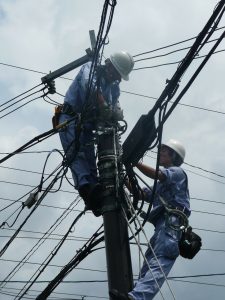Like any profession, becoming an electrician can’t be achieved in just a snap of your fingers.
This profession is one of the careers that keep our community functioning, so starting out can be quite a challenge.
So, how hard is it to become an electrician?
Let’s explore that, shall we?
How Do You Start as an Electrician?
Here are some facts you need to know to launch your electrician career.
To be able to provide electrical services legally, you need to have a license, except for apprentices and entry-level positions.
There are three licenses you can obtain:
- Journeyman electrician
- Master electrician
- Contractor electrician (for aspiring business owners)
To obtain a journeyman license, you must successfully complete an apprenticeship program.
Usually, it can take three to five years to complete, depending on the state.
There are different ways to get into an apprenticeship program, which can help with your employment and make connections.
- Get in touch with unions or non-union sponsors
- Enroll in a trade school
Is the Career Training Hard?
It will be.
But that’s because both apprenticeship sponsors and trade schools aim to set you up to become a successful electrician.
And so, you will start at the bottom and build your knowledge.
You’ll learn one skill after another, with experienced electricians teaching you the trade, such as:
- Basics of the job
- Needed math skills
- Other important entry-level skills (e.g., customer service)
What Will You Learn in an Electrician Training Program?
Keep in mind that every program curriculum can be different, but some courses are common.
You will learn important trade concepts such as the following:
Electrical Theory
It covers what electricity is and how it works.
These are big questions, and even practicing electricians take some time to understand electrical theory completely.
Algebra
Electricians do a lot of math on the job site, especially algebra.
That’s why most programs will require that you have completed high school algebra as a prerequisite.
This ensures that you can calculate accurately the needed equations related to the job.
National Electrical Code
In the U.S., the National Electrical Code (NEC) is a guidebook used by all electricians.
It tackles the safe installation of electrical equipment and wiring in residential, commercial, and industrial construction.
You’ll learn more about it during your apprenticeship.
Basic Residential and Commercial Job Responsibilities
This course will let you understand your responsibilities as an apprentice, journeyman, master, and contractor at a job site.
Through it, you will gain the basic skills necessary to assist the team.
Power Distribution
This course covers how electricity flows from a source to the locations on a grid.
It also includes regulations and rules determining its use.
Heavy Machinery and Electricity
You will learn what machines you will work with frequently within an industrial setting.
This includes how to install and maintain them.
Industrial electricians usually work in power plants and factories and need a solid understanding of the work in these settings.
How Challenging Is the Math That Electricians Use?
The math is surely harder than simple arithmetic, but it’s not impossible to learn it.
Many electricians say that it becomes easier over time the more you work in the field and see the concepts being applied.
If you worry about math, don’t, because you have a lot of time to learn.
Plus, if there’s something you don’t understand, your senior colleagues will help you.
Is Being an Apprentice Electrician Difficult?
When it comes to training, apprenticeships are exceptional.
There is no better way to learn the trade than that.
In the apprenticeship, you will work alongside the people who can…
- Answer all your questions
- Instruct you when you need it
- Share their field experiences, insights, and trade secrets
Many say apprenticeships are better than college, and you will learn everything you need to know.
Perhaps the hardest thing about it is actually getting into the apprenticeship program.
That’s because many people wish to become electricians, and apprentice positions are limited.
Plus, the apprenticeship exam can be difficult as it includes math that you may not be thoroughly familiar with.
Another challenge is the long apprenticeship period, but the wait will be worth it if it means you can be skilled in the trade.
Is the Field Work Difficult?
Like many trade professions, the work can be difficult, especially for first-timers in the field.
Some factors that can make it challenging include:
- Heavy workload can lead to physically demanding tasks
- Projects getting affected by bad weather
- Changing seasons leading you to work outside during extremely hot and cold temperatures
However, there is a positive aspect of the job that many appreciate: it’s a long-term career.
Unlike other professions, electricians don’t tend to change their careers halfway through.
That’s because many love being electricians and would like to continue to be one throughout.
Plus, if they want to be their own boss, they can choose to become an electrical contractor in the future.
Is It a Good Job?
This is a matter of personal opinion, but we think yes.
Electricians are well-paid and have good financial security.
Even without this, the levels of job satisfaction among electricians are high.
Those who can become masters can always have new and interesting work.
This page is also available in Spanish.










